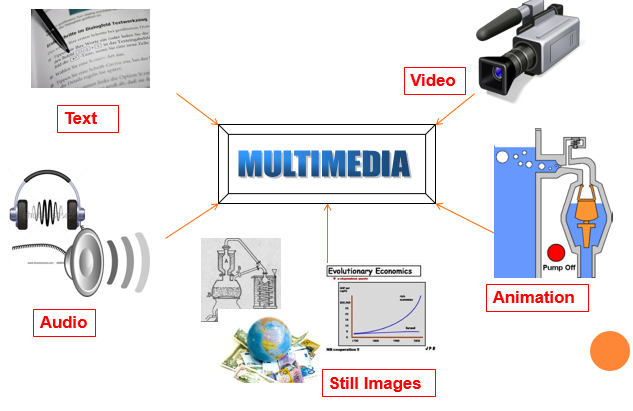Multimedia
What
is Multimedia?
In
the field of education, we have long used media, sometimes referred to as “audio-visual
aids”, to help in our teaching. These have been many and varied, and have
included things like movies, videos, slides, audio tapes, overhead
transparencies, along with various sorts of equipment such as cameras,
recorders and television monitors. The term “multimedia” is a relatively new
word that is used to describe a combination of different media, all being used
to best describe or explain something. Technically speaking, a movie projector
or video tape player is a multimedia device in its own right; since it combines
two or more media forms already - pictures plus sound. In recent times,
however, the computer has dominated the scene, and we are now at the point
where these remarkable machines can do just about anything that all the
previous things were able to do. So if you have not had to go through the “learning
curve” of old-fashioned and out-of-date technology, then you have a real
advantage.
What is Component Multimedia?
Text files: These
are normally word processor documents that are typed into a computer. They can
also be produced by scanning text from a book or elsewhere and then putting
them into a word processor file.
Text
files have file extensions like .doc,
.txt, .rtf, etc.
Drawing Files: Clip art and similar
drawings are available from many sources, including the internet and various software
libraries. Some programs come with a collection of freely available clip art. If
you have a drawing program on your computer, you may also be able to create
your own files. But be aware that some of these program take quite a long time
to learn. Picture files have extensions such as .wmf, .png, .dwg, and
many others.
Photographs
and pictures: Digital photographs
are now very common and can be made yourself on almost any digital
camera. The tricky job is often getting these into a computer where
they can be incorporated into a multimedia project. The best advice we
can give is for you to follow the instructions that came with your
camera. Photographs can also be scanned into your computer in the
same way as pictures. Digital imaging software can be used to alter your
pictures. Sometimes this is supplied with either your camera or
computer. Once again, it may take some time to become proficient in the use of
this. Photograph files have
extensions such as .jpg, .tif,
and others.
Sound recordings
AUDIO : CDs are probably the most common form of digital recordings,
but now it is also possible to make simple digital voice recordings on a number
of devices, including the computer of course. The old-style cassette tape
recorder is now replaced with a modern digital machine that records straight to
a computer storage device such as a hard disc. The most common sound files have extensions like .wav or .wma.
Videos: Most video production work is now done digitally. The
videotape is very rapidly becoming a thing of the past. In many countries now,
even the broadcast television channels transmit digital signals to TV sets, and
in the near future it is likely that the old non-digital sets (called analogue
receivers) will become obsolete. And we are all now familiar with DVDs of
course. For any who want to produce their own digital video recordings, the
latest generation of camcorders enable you to do this. Popular video file formats have the extensions .wmv, .avi, .mpg and many more.
Animations: Animations are like cartoons. They are pictures or other objects that
move. They could also be moving text. Animations can be very useful in
multimedia program, but they are difficult to create and the creation process
is very time-consuming. The file formats are usually the same as for videos.
References:
1.
Using Multimedia in the Classroom © 2011 Curriculum Materials and
Assessment Division, MESC, Samoa.
2.
Pengantar Multimedia Pembelajaran fakultas teknik, Universitas negeri Yogyakarta.
2014



Komentar
Posting Komentar